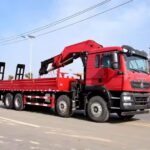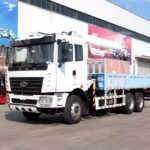In the world of heavy-duty towing and recovery, the advent of קראַנע טאָוו טראַקs has marked a revolutionary shift in capability and efficiency. These powerful machines, equipped with advanced crane systems, have become indispensable assets for towing companies, recovery operations, and various industries. In this comprehensive guide, we will delve into the intricacies of קראַנע טאָוו טראַקs, exploring their features, applications, and essential considerations for users.
I. Introduction to Crane Tow Trucks
Crane tow trucks, often referred to as wrecker cranes, combine the functions of traditional tow trucks with the added versatility of a crane. The integration of a crane system enables these trucks to lift and tow vehicles of various sizes and weights, making them indispensable in scenarios where conventional שלעפּ טראָקs may fall short.
1. Types of קראַנע טאָוו טראַקs:
There are different types of קראַנע טאָוו טראַקs designed to meet specific needs. The most common configurations include integrated boom and winch systems, rotators, and extendable boom cranes. Each type caters to distinct towing and recovery requirements, offering a range of capabilities to handle diverse situations.
2. Applications of קראַנע טאָוו טראַקs:
Crane tow trucks find applications in a multitude of industries. From recovering stranded vehicles on highways to assisting in the removal of damaged or overturned trucks, these versatile machines play a pivotal role in maintaining traffic flow and ensuring the safety of both motorists and operators. אַדישנאַל, קראַנע טאָוו טראַקs are employed in construction sites to lift and transport heavy equipment, showcasing their adaptability across various sectors.
II. Features and Components
Understanding the key features and components of קראַנע טאָוו טראַקs is essential for users to maximize their efficiency and safety. A comprehensive overview of these elements provides users with the knowledge required to operate these powerful machines effectively.
1. Crane Systems:
The heart of a קראַנע טאָוו טראַק lies in its crane system. These systems vary in design and capacity, with some models featuring telescopic booms for extended reach and flexibility. Users must familiarize themselves with the crane’s lifting capacity, reach, and operational controls to ensure safe and efficient usage.
2. Winch Mechanisms:
Winches are integral components of קראַנע טאָוו טראַקs, allowing for the controlled retrieval and lifting of vehicles. Understanding the winch’s pulling capacity, cable length, and proper usage techniques is crucial for successful towing operations. Users should be aware of the winch’s limitations and adhere to recommended safety practices.
3. Stabilization Features:
Given the diverse and often challenging terrains in which קראַנע טאָוו טראַקs operate, effective stabilization features are paramount. Outriggers and stabilizer legs provide the necessary balance and support, preventing the truck from tipping over during lifting operations. Users must follow proper deployment procedures and ensure a stable foundation before engaging in lifting activities.

III. Operational Guidelines
Operating a קראַנע טאָוו טראַק requires a combination of skill, וויסן, and adherence to safety protocols. Users should undergo comprehensive training to familiarize themselves with the equipment and its capabilities. אַדישנאַל, a thorough understanding of operational guidelines is essential for the smooth and secure execution of towing and recovery tasks.
1. Safety Precautions:
Safety should always be the top priority when operating קראַנע טאָוו טראַקs. Users must wear appropriate personal protective equipment (PPE) and follow safety guidelines outlined by regulatory authorities. Regular equipment inspections, maintenance, and adherence to load capacity limits are critical to preventing accidents and ensuring the well-being of operators and bystanders.
2. Communication Protocols:
Effective communication is vital during towing and recovery operations, especially when dealing with complex scenarios. Clear communication between operators, spotters, and other team members helps coordinate movements and ensures the safety of everyone involved. Establishing standardized communication protocols is essential for minimizing the risk of misunderstandings and accidents.
3. Environmental Considerations:
Crane tow trucks often operate in diverse environments, ranging from urban areas to rugged terrains. Users must consider environmental factors such as weather conditions, terrain stability, and traffic patterns. Adapting to the specific challenges presented by each scenario enhances the overall efficiency and safety of קראַנע טאָוו טראַק operations.
IV. Maintenance and Inspection
Proper maintenance און regular inspections are paramount to the longevity and reliability of קראַנע טאָוו טראַקs. Users should adhere to a rigorous maintenance schedule, conducting both daily pre-operational checks and more comprehensive periodic inspections.
1. Daily Checks:
Before each operation, users should perform a series of pre-operational checks to ensure that all components, including the crane system, winch, and stabilizers, are in optimal condition. Addressing any issues promptly can prevent equipment failures during critical towing tasks.
2. Periodic Inspections:
In addition to daily checks, קראַנע טאָוו טראַקs require periodic inspections by qualified technicians. These inspections should encompass a thorough examination of critical components, hydraulic systems, and structural integrity. Identifying and addressing potential issues in advance minimizes the risk of unexpected breakdowns and enhances the overall reliability of the equipment.
V. Future Trends and Innovations
ווי טעכנאָלאָגיע האלט צו שטייַגן, the field of קראַנע טאָוו טראַקs is not exempt from innovation. The integration of smart technologies, improved materials, and enhanced safety features is shaping the future of these indispensable machines.
1. Telematics and Connectivity:
The incorporation of telematics allows קראַנע טאָוו טראַקs to be connected to centralized monitoring systems. This enables real-time tracking of the equipment’s location, פונקציאָניר, and maintenance needs. Telematics not only streamlines fleet management but also enhances overall operational efficiency.
2. ענכאַנסט זיכערקייַט סיסטעמען:
Future קראַנע טאָוו טראַקs are likely to feature advanced safety systems, including collision avoidance technology, automated emergency braking, and proximity sensors. These innovations aim to reduce the risk of accidents and enhance the safety of both operators and the surrounding environment.
3. Environmental Considerations:
In response to growing environmental concerns, manufacturers are exploring eco-friendly alternatives for קראַנע טאָוו טראַקs. Electric and hybrid propulsion systems are emerging as viable options, offering reduced emissions and operational costs.

VI. ויסלאָז
The unveiling of קראַנע טאָוו טראַקs has undoubtedly transformed the landscape of heavy-duty towing and recovery. As these machines continue to play a pivotal role in diverse industries, users must equip themselves with the knowledge and skills necessary to operate them safely and effectively. This user’s handbook serves as a comprehensive guide, offering insights into the features, applications, operational guidelines, and future trends of קראַנע טאָוו טראַקs. By embracing best practices and staying informed about technological advancements, users can harness the full potential of these powerful assets while contributing to the advancement of the towing and recovery industry.









